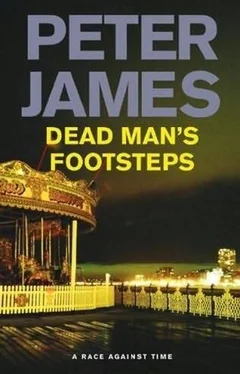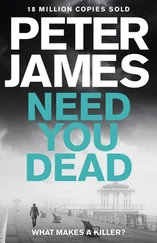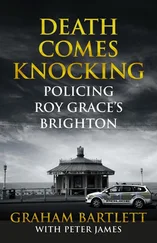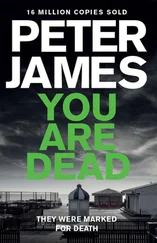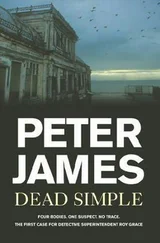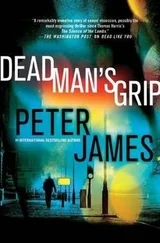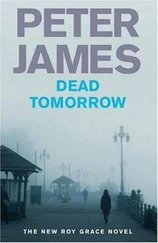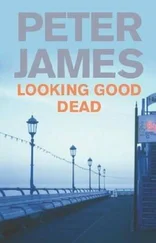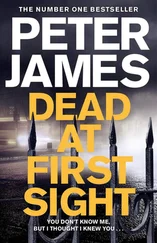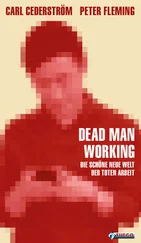‘You and most of New York, buddy,’ said the older of the soldiers. He gave Ronnie a smile, a kind of helpless, we’re-all-in-this-shit-together smile.
A backhoe excavator, followed by a bulldozer, rumbled through the barrier.
The other soldier pointed a finger down the street. ‘Make a left, first left, you’ll see a bunch of tents. They’ll kit you out, tell you what to do. Be lucky.’
‘Yeah,’ Ronnie said. ‘You too.’
He ducked under the barrier and, after only a few more strides, the whole vista of the devastated area started opening up before him. It reminded him of pictures he had once seen of Hiroshima after the atomic bomb.
He turned left, unsure of his bearings, and followed the street for a short distance. Then, ahead of him, the Hudson suddenly appeared, and right by the river he saw a whole makeshift encampment of stalls and tents at the edge of a massive area of rubble.
He walked past an upturned sports utility vehicle. A shredded fireman’s jacket lay on the ground near it, yellow bands on the grey, dusty, empty uniform. One sleeve had been ripped off and lay some distance from it. A fireman in a dusty blue T-shirt, sitting on a small mound of rubble, was holding his head in one hand, a water bottle in the other, looking as if he couldn’t take much more.
In a momentary respite from the helicopters, Ronnie heard new sounds: the roar of lifting gear, the whine of angle cutters, drills, bulldozers, and the intermittent warble, wails and shrieks of mobile phones. He saw an ant-line of people, many in uniforms and hard hats, entering the cluster of tents. Others were queuing at stalls made from trestle tables. There were new smells here too, of spit-roasted chicken and burgers.
In a daze, he suddenly found himself in line, passing a stall where someone handed him a bottle of water. At the next stall he received a face mask. Then he went into a tent, where a smiling, long-haired guy who looked like a superannuated hippie, handed him a blue hard hat, a torch and a spare supply of batteries.
Cramming his baseball cap into his pocket, Ronnie put on his face mask and then the hard hat. He passed another stall, where he declined an offer of socks, underwear and work boots, and continued out of the rear entrance. Then he followed the ant-line past the blackened shell of a building. An NYPD cop in a hard hat and a filthy blue stab vest trundled past on a green tractor, towing what looked like plastic body bags.
Beyond a blackened leafy tree, Ronnie saw a bird flying above a skeleton in the sky. One massive wall of a structure rose at a precarious angle, like the Leaning Tower of Pisa, all the glass gone from the windows, which were still otherwise intact, and the forty or fifty floors of offices that should have been beside it gone, collapsed.
He was stumbling over the roofs of smashed police cars and then across the underbelly of a half-buried fire truck. Every now and then from somewhere under the rubble there was the sound of a mobile phone ringing. Small teams of people were digging frantically and shouting. Dog handlers were dotted around, with German Shepherds, Labradors, Rottweilers and other breeds he didn’t recognize straining on their leashes, sniffing.
He continued forward, passing a swivel chair covered in dust, with an equally dusty woman’s jacket slung over the back. There was a telephone handset on a cord entwined around it, dangling from the seat.
He saw something glinting. Looking closer, he realized it was a wedding band. Near it he saw a smashed wrist watch. Chains of people were pulling out pieces of rubble, passing them back. He stepped aside, watching, taking it all in, trying to understand the pattern of what was going on. Eventually he realized there was no real pattern. There were just people in uniforms around the edges, holding huge black garbage sacks that people were bringing things they found to.
In front of him he saw what at first he thought was a broken waxwork. Then he realized, to his revulsion, that it was a severed human hand. He felt his breakfast rising up his throat. He turned away and swigged some of his water, feeling the dry dust dissolving in his mouth.
He noticed a sign painted in red on a brown hoarding at the edge of the devastation. It read GOD BLESS FDNY & NYPD.
Again there were all kinds of drained-looking people stumbling around the perimeter of the site, holding up photographs. Men, women, children, some of them small kids, mingling with all the different uniformed rescue services in helmets, masks, respirators.
He walked past a burnt cross, having to concentrate to keep his balance on the shifting mass beneath him. He saw a crane bent like a dead T.Rex. Two men in green surgical scrubs. He passed an NYPD officer in a blue helmet with a miner’s lamp, and what looked like mountaineering gear slung from his belt, cutting into the rubble with a motorized angle grinder.
A Stars and Stripes flag leaned out of the rubble at a drunken angle, as if someone had just conquered this place.
It was total and utter chaos. And seemingly uncoordinated.
It was perfect, Ronnie thought.
He glanced over his shoulder. The long ant-line stretched, never-ending, behind him. He stepped aside, letting it continue past him, and moved further away. Then, surreptitiously, and with some small regret, he dropped his mobile phone on to the rubble and trod it in. He stamped on it and took a few steps forward. Next, he pulled his wallet out of his jacket and checked through it, removing the dollar bills and jamming them in the rear pocket of his jeans.
He left his five credit cards, his RAC membership card, his Brighton and Hove Motor Club membership card and, after some moments of thought, his driving licence as well.
Unsure whether he could smoke here or not, he discreetly put a cigarette in his mouth, pulled out his lighter and cupped his hands over the flame. But instead of lighting his cigarette, he began singeing the edges of his wallet. Then he dropped that into the rubble also and stamped it in, hard.
Then he lit his cigarette and smoked it gratefully. When he had finished, he ducked down and retrieved his wallet. Then he retraced his steps and picked up his mobile phone. He carried them across to one of the makeshift repositories for recovered items.
‘I found these,’ he said.
‘Just drop them in the bag. All gonna be gone through,’ an NYPD woman officer told him.
‘They might help identify someone,’ he said, just to be certain they took notice.
‘That’s what we’re here for,’ she assured him. ‘We gotta lotta people missing from Tuesday. Lotta people.’
Ronnie nodded. ‘Yep.’ Then, to further double-check, hepointed at the bag. ‘Someone’s logging everything?’
‘You bet. All gonna be logged, honey. Every damned item. Every shoe, every belt buckle. Anything you can find out there, you just hand it.’
‘All of us got family in there – somewhere,’ the officer replied, waving her hand expansively at the devastation in front of them. ‘Every damn person in this city got a loved one in there.’
Ronnie nodded and moved away. It had been much easier than he had thought.
OCTOBER 2007
‘Here,’ Abby said. ‘Just past the lamppost on the left.’ She glanced again over her shoulder out of the rear window. No sign of Ricky’s car or him. But it was possible he could have come a quicker route, she thought. ‘Could you drive past, turn left and go around the block, please.’
The taxi driver obliged. It was a quiet, residential area, close to Eastbourne College. Abby scanned the streets and parked cars carefully. To her relief, she could see no sign of Ricky’s rental car or him.
The driver brought her back into the wide street of semidetached red-brick houses, at the end of which, totally out of character with the area, was the 1960s low-rise block of flats where her mother lived. It had been built cheaply at the time and four decades of battering from the salty Channel winds had turned it into an eyesore.
Читать дальше
